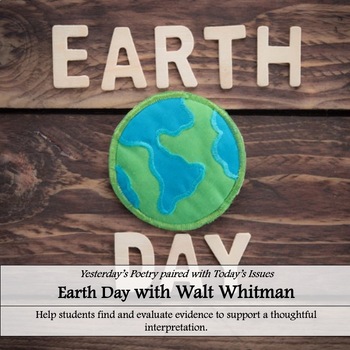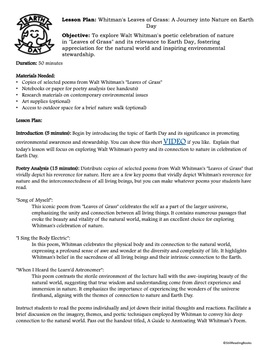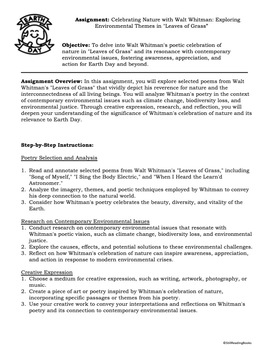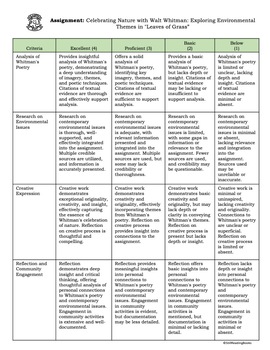Earth Day: Walt Whitman's Poetry and Contemporary Environmental Issues
- PDF
- Google Apps™

Description
Looking for a way to connect yesterday's poetry from Walt Whitman's "Leaves of Grass" with today's contemporary environmental issues that are discussed on Earth Day?
In this interdisciplinary assignment, students will embark on a journey to explore the timeless poetry of Walt Whitman in the context of contemporary environmental issues. Through a combination of literary analysis, research, creative expression, and community engagement, students will deepen their understanding of Whitman's celebration of nature and its resonance with pressing environmental challenges.
Included in this product is the following:
Lesson Plan: The assignment is structured around a comprehensive lesson plan that guides students through the exploration of selected poems from Whitman's "Leaves of Grass," analysis of contemporary environmental issues, creative expression, reflection, and community engagement.
Student Handout: A detailed assignment sheet provides step-by-step instructions for students, outlining the objectives, tasks, and submission guidelines. It includes prompts for poetry analysis, research on environmental issues, creative expression, reflection, and community engagement activities.
Resources for Students: Students have access to a variety of resources to support their learning:
- A Google Slide presentation introduces contemporary environmental issues, providing an overview of climate change, biodiversity loss, and environmental justice.
- A guide to annotating Walt Whitman's poems offers students strategies for analyzing and interpreting Whitman's poetry effectively.
- Links to environmental research websites, including NASA Climate Change, Environmental Justice Atlas, and World Wildlife Fund, provide students with credible sources of information. A MLA Works Cited page ensures proper citation of these resources.
Rubric for Grading: A detailed rubric outlines the criteria for evaluating students' performance on the assignment, including analysis of Whitman's poetry, research on environmental issues, creative expression, reflection, and overall presentation. The rubric ensures consistency and fairness in grading, providing students with clear expectations and feedback.
Through this assignment, students not only engage deeply with Whitman's poetry but also develop critical thinking skills, research proficiency, creative expression, and a sense of civic responsibility toward environmental stewardship. By exploring the intersection of literature and environmental science, students gain a holistic understanding of the complex relationship between humanity and the natural world.
Interested in other ways to explore Earth Day in your classroom? Check out these assignments below:
Earth Day: Writing with Evidence
Earth Day with Four Types of Sentences Worksheet





